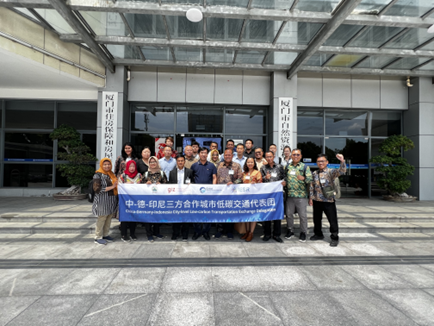From 10 to 16 September 2023, the Urban-Act project hosted an Indonesian delegation on low-carbon transportation planning in China in collaboration with the Fund for Triangular Cooperation (Trico Fund). During its stay, the delegation made on-site visits in Xiamen, Shenzhen, and Guangzhou.

Indonesia, the world’s fourth most populous nation and one of the top ten greenhouse gas emitters, plays a pivotal role in global climate change mitigation efforts. Notably, the transportation sector ranks as the second-largest source of greenhouse gas emissions in Indonesia, closely intertwined with urbanisation, economic development, and the daily lives of its citizens. The rapid pace of urbanisation in Indonesia has added a layer of complexity to addressing climate change. Consequently, the decarbonisation of Indonesia’s transportation sector should follow a cautious, phased approach, coupled with insights drawn from international experiences and technological pathways.
China, the world’s second-most populous country and the largest emitter of greenhouse gases, has committed itself to peaking CO2 emissions before 2030 and achieving carbon neutrality before 2060. To attain these ambitious objectives, China has proactively undertaken initiatives in low-carbon urban planning, with cities like Shenzhen and Guangzhou leading the way in sustainable urban development. In the realm of urban transportation, China has accumulated extensive and advanced experiences.
In this context, the Urban-Act project, funded by the International Climate Initiative (IKI) under the German Federal Ministry for Economic Affairs and Climate Action (BMWK), collaborated with the Trico Fund, funded by the Federal Ministry for Economic Cooperation and Development (BMZ), to organise and host a study tour in China of a delegation from Indonesia.
This visit served as a follow-up to an exchange and capacity building workshop on climate-friendly transport policy held in Semarang, Indonesia, in early August. The Indonesian delegation comprised 16 members representing various Indonesian government agencies, institutions, and international organisations. Notable participants represented, amongst others, Medan City’s Transportation Agency and Local Development Planning Agency, Padang City’s Transportation Agency, Secretariat, and Local Development Agency, Central Java’s Office of Provincial Government Secretary and Regional Development Planning Agency, United Cities and Local Governments Asia-Pacific (UCLG ASPAC), GIZ Indonesia, and the Institute for Essential Services Reform (IERS). Their collective mission was to gain insights and exchange best practices on the topic of low-carbon transportation and urban planning in China, with a specific focus on implementing low-carbon transportation planning and associated measures. The ultimate aim was to provide viable solutions for Indonesia’s own sustainable urban development, particularly in the transportation sector.
The tour commenced in Xiamen, where the delegates engaged in productive discussions on sustainable, low-carbon urban planning with experts from Xiamen’s Natural Resources Bureau, Xiamen Transportation Research Center, and Tongji University. During their stay, the delegation experienced China’s pioneering elevated bus rapid transit (BRT) system and observed the rapid charging and vehicle depot management system of the BRT system. Additionally, they explored Xiamen’s elevated urban greenway, a harmonious blend of environmental protection, low-carbon practices, and human-centric eco-tourism. Their visit to Gulangyu Island, where vehicles and bicycles are restricted, exemplified innovative low-carbon urban management concepts.
After two days in Xiamen, the delegation proceeded to Shenzhen, a city that has fully electrified its public and taxi fleets. In Shenzhen, the group visited the Shenzhen Bus Group, gaining valuable insights into the intelligent management of public buses, taxis, and ride-hailing services. They also toured two charging stations designed for social passenger cars and commercial vehicles, acquiring knowledge about high-power rapid charging station equipment and technology. Their final visit to Shenzhen Streamax Technology Co., Ltd. provided an opportunity to exchange ideas on the latest cutting-edge technologies and products related to vehicle digital monitoring management applications. Discussions revolved around how these technologies could enhance the efficiency and safety of public transportation operations, paving the way for feasible solutions to enhance Indonesia’s diverse public transportation systems in the future.

The delegation’s final destination was Guangzhou, where they were accompanied by representatives from the Institute for Transportation and Development Policy (ITDP). Here, they experienced Guangzhou’s BRT system, the world’s largest BRT network. Spanning over 22.9 km through the city centre, the BRT network is served by more than 350 BRT buses traveling in a single direction per hour. Notably, Guangzhou’s BRT system is seamlessly integrated into the metro network and is also the first in China to incorporate BRT stations directly into surrounding commercial buildings. Furthermore, the delegation visited the Guangzhou Institute of Energy Conversion, part of the Chinese Academy of Sciences, to gain insights into the latest technologies in renewable and new energy. The last activity of the tour led the delegation to the GAC Trumpchi plant, where Chinese brands of NEV passenger vehicles, like AION and Hyper, are manufactured. At the plant, the delegation learnt about the performance of the cars as well as the related battery technologies.


During this six-day visit from 10 to 16 September, the Indonesian delegation delved deeply into China’s experiences in low-carbon transportation and urban spatial planning. They visited exemplary urban development projects and engaged in communication with local government departments, institutions, and enterprises in related fields, establishing close connections. From a project perspective, the collaboration between the two GIZ projects coordinating this delegation tour leveraged resources and enhanced the overall impact of the study tour. It also opened doors to potential future collaborations between China, Indonesia, and Germany. Looking ahead, the Trico Fund project will continue to support sustainable development in Indonesia through tripartite cooperation between Germany, China, and Indonesia. In consideration of budgetary and human resource capacity, the Urban-Act China component plans to organise further delegation visits in the future. These visits aim to facilitate direct and effective sharing of China’s achievements and experiences in low-carbon development with other partner countries involved in the project. This aligns with its role as a knowledge partner, contributing to the dissemination of Chinese knowledge to other partner countries of the Urban-Act project.



